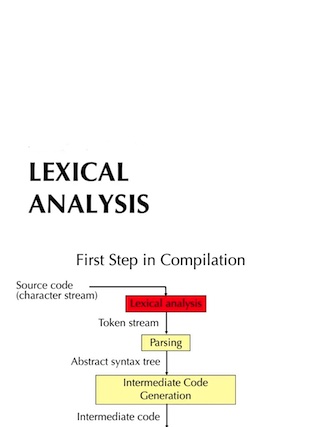
|
FreeComputerBooks.com
Links to Free Computer, Mathematics, Technical Books all over the World
|
|
- Title Lexical Analysis and Parsing using C++
- Author(s) Bruno R. Preiss
- Publisher: www.brpreiss.com (2004)
- eBook: PDF, 390 pages
- Language: English
- ISBN-10: N/A
- ISBN-13: N/A
- Share This:

|
This new, expanded textbook describes all phases of a modern compiler: lexical analysis, parsing, abstract syntax, semantic actions, intermediate representations, instruction selection via tree matching, dataflow analysis, graph-coloring register allocation, and runtime systems. It includes good coverage of current techniques in code generation and register allocation, as well as functional and object-oriented languages, that are missing from most books.
A unique feature is a practical implementation project in C++.
About the Authors- N/A

- Lexical Analysis and Parsing using C++ (Bruno R. Preiss)
- The Mirror Site (1) - HTML
- The Mirror Site (2) - PDF
- Video Lecture (YouTube)
-
 Parsing Techniques - A Practical Guide (Dick Grune, et al)
Parsing Techniques - A Practical Guide (Dick Grune, et al)
Parsing techniques provide a solid basis for compiler construction and linguistics, and contribute to all existing software: they enable Web browsers to analyze HTML pages and PostScript printers to analyze PostScript, code generation in compilers, etc.
-
 Bison: The Yacc-compatible Parser Generator
Bison: The Yacc-compatible Parser Generator
This book provides a quick overview of the theory behind context-free grammars and semantic values. It has both an introductory tutorial section with examples and a reference section which explores parts of Bison in detail.
-
 Compiler Construction using Flex and Bison (Anthony Aaby)
Compiler Construction using Flex and Bison (Anthony Aaby)
This is a guide to compiler construction using compiler's compiler tools like Flex and Bison. It details the techniques and methods used to implement the different phases of the compiler with the help of FLEX and YACC tools. You still needs C programming.
-
 Compiler Design in C (Allen I. Holub)
Compiler Design in C (Allen I. Holub)
It teaches real-world compiler design concepts and implementation, with the basics of compiler design, concentrating on the second pass (in a typical four-pass compiler), consisting of a lexical analyzer, parser, and a code generator, etc.
-
 Introduction to Compilers and Language Design (Douglas Thain)
Introduction to Compilers and Language Design (Douglas Thain)
This book offers a one semester introduction into compiler construction, enabling the reader to build a simple compiler that accepts a C-like language and translates it into working X86 or ARM assembly language.
-
 Compiler Design: Theory, Tools, and Examples (Seth Bergmann)
Compiler Design: Theory, Tools, and Examples (Seth Bergmann)
This is an introductory level text for compiler design courses, that emphasizes problem solving skills. The concepts are clearly presented with sampler problems and diagrams to illustrate the concepts.
-
 Basics of Compiler Design (Torben Mogensen)
Basics of Compiler Design (Torben Mogensen)
This book presents techniques for making realistic, though non-optimizing compilers for simple programming languages using methods that are close to those used in 'real' compilers, albeit slightly simplified in places for presentation purposes.
-
 Modern C++ Tutorial: C++11/14/17/20 On the Fly (Changkun Ou)
Modern C++ Tutorial: C++11/14/17/20 On the Fly (Changkun Ou)
The book is intent to provide a comprehensive introduction to the relevant features regarding modern C++ (before 2020s). You should be aware that not all of these features are required. Instead, it should be learned when you really need it.
-
 Fundamentals of Programming C++ (Richard L. Halterman)
Fundamentals of Programming C++ (Richard L. Halterman)
This book teaches the basics of C++ programming in an easy-to-follow style, without assuming previous experience in any other language. It explains fundamental concepts and techniques in greater depth than traditional introductions.
-
 Thinking in C++, Vol 1: Introduction to Standard C++ (2nd Edition)
Thinking in C++, Vol 1: Introduction to Standard C++ (2nd Edition)
Thinking in C++ by Bruce Eckel is the one C++ book you must have if you're doing serious development with C++. The book filled with expert advice and written in a patient, knowledgeable style.
-
 Thinking in C++, Vol 2: Practical Programming (Bruce Eckel)
Thinking in C++, Vol 2: Practical Programming (Bruce Eckel)
Thinking in C++, Volume 2 covers of advanced topics all professional C++ developers must master - way beyond the introductory level. No other text covers the topics needed to prepare you for production C++ programming.
-
 The Rook's Guide to C++ (Jeremy A. Hansen)
The Rook's Guide to C++ (Jeremy A. Hansen)
This textbook written by Norwich University students and faculty aims to provide an introduction to the C++ programming language. This step-by-step book is ideal for first-time programmers or those new to C++.
-
 C++ Annotations: An Extensive Tutorial (Frank B. Brokken)
C++ Annotations: An Extensive Tutorial (Frank B. Brokken)
This book covers C++11 and is intended for knowledgeable users of C (or any other language using a C-like grammar, like Perl or Java) who would like to know more about, or make the transition to, C++.
-
 A Complete Guide to Programming in C++ (Ulla Kirch-Prinz, et al.)
A Complete Guide to Programming in C++ (Ulla Kirch-Prinz, et al.)
This book was written for both students interested in learning the C++ programming language from scratch, and for advanced C++ programmers wishing to enhance their knowledge of C++.






